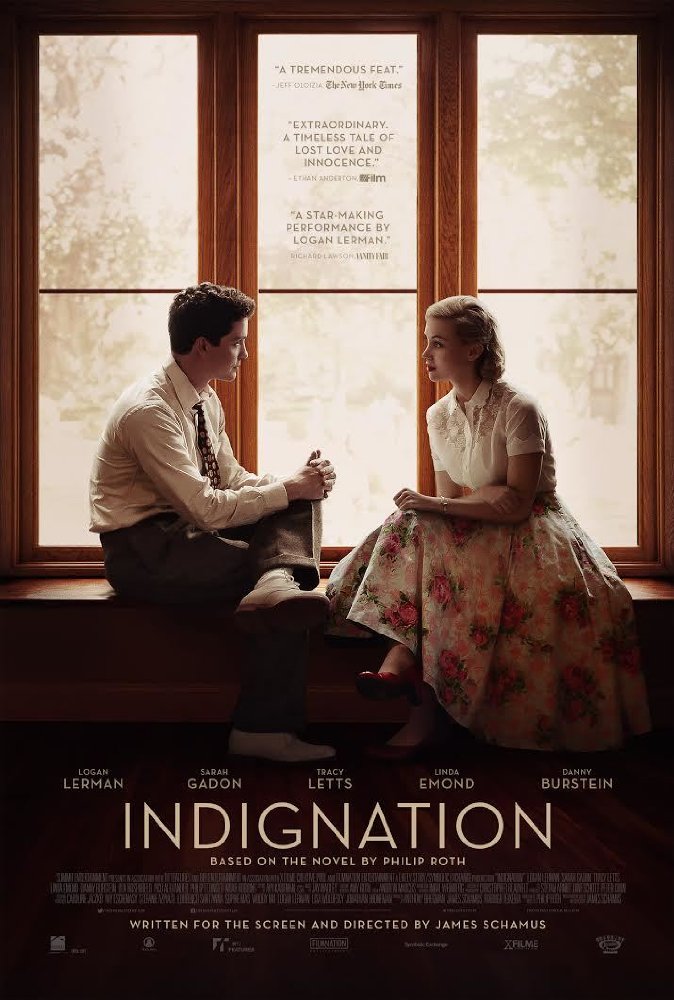
Review: Indignant student rejects 1950s societal norms
“Indignation” brings to life the popular Philip Roth novel about a 1950s college student’s fight against religious and social conformity through a complex performance from its lead actor, Logan Lerman.
The latest entry in this semester’s Film and Speaker Series screened in the Student Services Building (SSCB) Lecture hall Oct. 2.
The film’s title, “Indignation,” appropriately describes the feeling that the film’s central character, Marcus, expresses toward his overbearing father and suppressive dean throughout the movie.
The film is set during the Korean War, a time when atheism and pre-marital sexual encounters were considered taboo, especially for someone like Marcus, who comes from a devout Jewish family.
Marcus is a brilliant student who comes from a Jewish family in Newark, New Jersey, who chooses to attend a private college in Ohio in order to get away from his overbearing father who scolds Marcus any time he doesn’t know where he is. Despite his family’s Jewish background, Marcus is an atheist who finds the idea of praying preposterous.
Marcus’ indignation soon turns toward the dean of his college for questioning his lack of religious belief and requiring that all students attend a weekly chapel session. He is discouraged by his dean to exercise his own non-religious beliefs with his refusal to believe in God.
The scene where the dean calls Marcus into his office to discuss Marcus’ request for another room after a dispute with his roommates is the defining point of the film. Marcus is questioned by the dean about his atheistic beliefs and social shortcomings in making friends with other students.
Marcus becomes increasingly annoyed at the grilling and continues to give logical counterarguments to every attempt the dean is making to convince Marcus to behave and think in accordance with the dean’s philosophies.
This scene is especially significant and representative of the film as a whole. Marcus feels constrained by pre-conceived “formalities” that he is being pressured to live by, and he wants to be able to do whatever he feels regardless of what others think he should be doing. The back and forth between Marcus and the dean made the scene very comedic as the two men trade witty comebacks like they were in a boxing match. As Marcus becomes more angered, the dean becomes more amused.
While in college, Marcus develops a romantic relationship with a wealthy girl, Olivia, who suffers from an anxiety disorder. However, he is forbidden by his parents to become tempted by the allure of women.
Director James Schamus’ focus in this film was to show the difficulties of finding one’s path in a society that represses sexuality and freedom of speech and thought. The acting from the entire cast, particularly the lead actors, was superb. Logan Lerman, in the role of Marcus, was able to portray him as a sympathetic figure, but also someone with inner rage toward idiotic principles that he felt were being forced onto him. Lerman’s argumentative flair and indignant demeanor really make Marcus stand apart from the rest of the characters in the film, who seem fine with conforming to social and societal norms.
At the conclusion of each screening in the Film and Speaker Series, there is a guest speaker who discusses the film. This film featured two guest speakers: Maida Asofsky, a board member of Americans United for the Separation of Church and State, and John Gorman, professor emeritus of literature.
Asofsky explained that requiring students to attend a religious service is acceptable for private universities because they do not receive government funding.
Marcus’ college, Winesburg College, is a private institution and, therefore, can enforce religious requirements from their students. Public universities, however, cannot require students to attend a religious service.
“Situations like the one Marcus faced in the film are why I feel it is important in maintaining the separation of church and state in school and government affairs,” Asofsky said.
Gorman wanted to speak about the film because he really enjoyed the book that inspired the film. He spoke about the emphasis that society placed on “fitting in” during the 1950s and how Marcus’ struggles were due to his refusal to do so.
“A lot of people have said that this movie sort of conveyed the mood of the 1950s, which was either conform or die,” Gorman said.
The Office of Student Life’s Film and Speaker Series is showing “Equal Means Equal” on Saturday, Oct.15, and “The Head of Joaquin Murrieta,” featuring the film’s director, John J. Valadez, as a guest speaker Friday, Oct. 21, in the SSCB Lecture hall. Admission for the two films is free for everyone. More information on the Film and Speaker Series can be found here: http://prtl.uhcl.edu/student-life/get-involved/film-speaker-series.

Wow, I would’ve never even heard of this movie had you not have reviewed it here. Sounds really interesting. I’ll have to look for it at Red-box or the public library! Thanks!